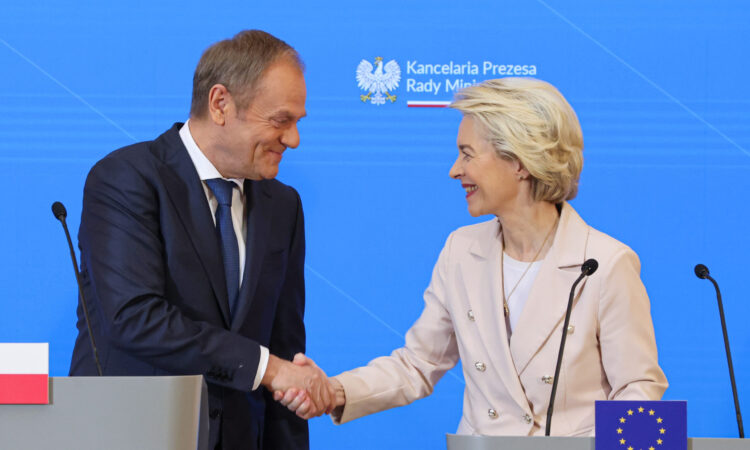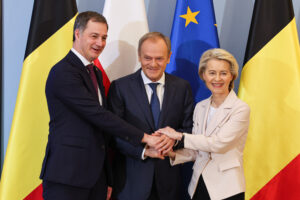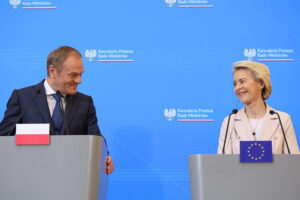
Brussels – Reforms on the rule of law in Poland are proceeding apace, and after this week’s positive discussions in the Council on the possible closure of the procedure under Article 7 of the Treaty on European Union, it is the President of the European Commission, Ursula von der Leyen, who delivered the most eagerly awaited news in Warsaw: “Next week the college will take two decisions on EU funds currently blocked for Poland, which will release up to 137 billion euros from the Next Generation Europe and Cohesion funds.” The announcement, in the air, since news of von der Leyen’s trip to Warsaw was leaked on Tuesday (Feb. 20), came during a press point with the Polish Prime Minister, Donald Tusk, and his Belgian counterpart and rotating President of the EU Council, Alexander De Croo, following this morning’s (Feb. 23) trialogue talks. “Today is a great day; thank you for understanding our problems of the recent past,” were Tusk’s words.

“It is a decisive moment for the promotion of democratic values; we were impressed by your progress in restoring the rule of law as the backbone of your society,” President von der Leyen began in Warsaw, recalling how the issue is felt throughout the Union, “because it is the essential condition for European citizens to feel free and secure.” At Tuesday’s General Affairs Council, the Polish government submitted an action plan to implement all the required reforms of the judiciary, which will bring two tangible benefits to Poland: on the one hand, the closure of the procedure opened in 2017 by the European Commission (which if approved by the council could have deprived the country of its EU membership rights) and on the other hand, the green light to EU funds currently blocked in Brussels. “This is a powerful statement, a clear roadmap for Poland; your efforts are decisive,” confirmed the EU Commission’s number one.
The “good news” on the €137 billion is based precisely on the “reforms you have launched and the many immediate steps you have taken on judicial independence,” including decisions to join the European Public Prosecutor’s Office (EPPO), to respect the rulings of the EU Court of Justice and the European Court of Human Rights, and to separate the office of attorney general from that of justice minister (as Justice Commissioner Didier Reynders had also reported on Tuesday on the sidelines of the Council). “We support the reforms of your leadership; I share the happiness for news that one does not receive every day,” De Croo confirmed. Poland thus puts itself on track to receive €76.5 billion in Cohesion Policy funds and €59.8 billion from the National Recovery and Resilience Plan (NRRP), of which €5 billion has already arrived as pre-financing from the RePowerEu chapter after the December meeting in Brussels between von der Leyen and Tusk on the sidelines of the European Council. Awaiting the green light from the College of Commissioners next Tuesday (Feb. 27) on the release of Cohesion funds and the preliminary assessment of the first NRRP payment request, Chairwoman von der Leyen has already disclosed that the first tranche “will include €1.4 billion available immediately for Polish farmers to expand and modernize production.”

From left: Poland’s Prime Minister Donald Tusk and European Commission President Ursula von der Leyen in Warsaw (Feb. 23, 2024)
It is precisely on the question of farmers’ protests that the EU Commission’s number one wanted to dwell—aware also of the new rally that will take place on Monday (Feb. 26) in Brussels. “We discussed the situation experienced by our citizens in Europe and Poland,” von der Leyen explained, reiterating her “deep admiration for their hard work to bring healthy food to our tables every day,” but also the knowledge that “they face many challenges and are concerned about their future, and this is legitimate.” In addition to the proposals to reduce farmers’ administrative burdens unveiled yesterday (Feb. 22), von der Leyen was keen to emphasize that “we have been listening and acting” not only in Poland—”the EU already supports Polish farmers with 22 billion from the Common Agricultural Policy and more will come”—but also by “preparing the agriculture of the future in our strategic dialogue” with representatives of the profession.
The disputes between the EU and Poland
.
Since 2015, the ultra-conservative former ruling party Law and Justice has put pressure on relations with Brussels in many respects, especially on EU standards of respect for the rule of law. Since 2021, there has been an ongoing legal dispute brought about by two rulings by Poland’s Constitutional Court: the first on Jul. 14, when judges in Warsaw rejected the EU regulation allowing the EU Court of Justice to rule on “systems, principles, and procedures” of Polish courts; the second on Oct. 7, when the Constitutional Court has challenged the primacy of EU law, calling Articles 1 and 19 of the Treaty on European Union (TEU) and several rulings by EU courts “incompatible” with the Polish Constitution. At the centre of the dispute is the decision to provisionally suspend the powers of the Disciplinary Chamber of the Supreme Court of Poland due to several arbitrary measures against magistrates disliked by the governing majority. While the infringement procedure is underway by the European Commission, the EU Court of Justice ordered the member country to pay a one million euro per day fine: from Oct. 27, 2021, to Apr. 14, 2023, the bill had risen to over half a billion euros (526 million to be exact).
Added to this is the dispute between Warsaw and Brussels over the Turów mine. On Sept. 20, 2021, the Court of Justice of the EU had decided to impose a daily fine of €500,000 on Poland for failing to stop the operations of the mine and its power plant on the border with the Czech Republic following Prague’s complaint in February of that year. According to European judges, extending the mine’s operations until 2026 would adversely affect the water supply of its citizens on the border. Still, Warsaw has refused to pay what the ruling stipulated. Despite closing the case on Feb. 4, 2022, thanks to an agreement between the two governments, the EU Court of Justice decided to close the case but without revoking the fine. Thus, a few days later, the EU Commission decided to withhold approximately €15 million from EU funds allocated for Poland precisely because of the failure to pay what the EU Court had imposed from Sept. 20 to Oct. 19, 2021. The standoff continued over the next year and a half of Morawiecki’s government, with the climax reached last Dec. 10 (the same day that Morawiecki was rejected in the national parliament for a new term as premier) when the Constitutional Court of Poland declared the fines imposed unconstitutional, also regarding the Turów lignite mine.
English version by the Translation Service of Withub






